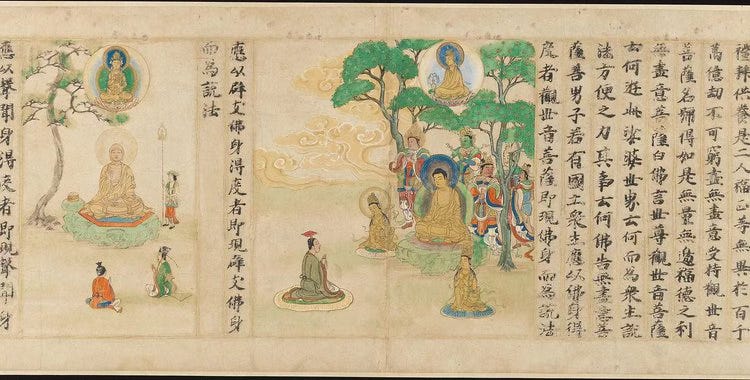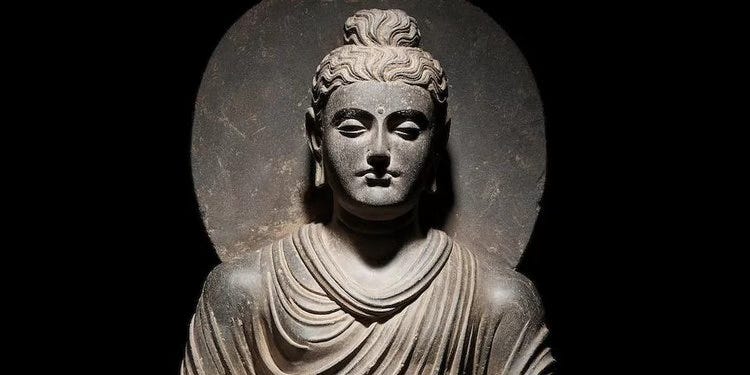Welcome to Enlightenment Legacies
A growing collection of stories illuminating the world of Buddhism beyond individual traditions, regional boundaries, and interpretive frameworks.
Welcome to Enlightenment Legacies, a growing collection of essays and keywords illuminating the world of Buddhism and its storytelling tradition. This journey takes us beyond individual traditions, regional boundaries, and interpretive frameworks, offering a view on how the narratives of Buddhism’s enlightened founder, his teachings, and his world reverberate in contemporary society.
In this collection, you will encounter insights into revered masters, teachings, and lineages. Yet, the journey extends further. It encompasses an examination of the cultural and historical interactions that have charted Buddhism’s trajectory from its Asian origins to its spread across Europe and the Americas, and their modern re-emergence in Asia.
Ever since my late teens, when I began reading about Buddhism, and even more so in my early twenties, when I began my formal training in Buddhist Studies, a question kept surfacing in my mind, as to why, in the European languages, we employed the word “enlightenment” to talk about what, I thought, we should best call the Buddha’s “awakening” (in Sanskrit, bodhi बोधि): and so we had “Illuminazione” in Italian, “Illumination” in French, “Enlightenment” in English, “Erleuchtung” in German, and so on. How did earlier generations of scholars, in particular during and after the Age of Enlightenment, came to conceive of the Buddha’s perfect, complete knowledge in connection with the “light” of reason?
I sought to find answers to this question in my readings. My curiosity intensified over my grad school years, and in particular, after a conversation I had with my cohort during a Seminar in Buddhist Studies at the University of Michigan. Indeed, it appears that in the decades around the French Revolution, the Buddha, or “Fo” (the Chinese name of the Buddha), as the French called him at the time, was still perceived as an idol. His teachings were recognized as a philosophy only around the turn of the nineteenth century. In this sense, the Buddha became “enlightened” only after early Orientalists began to regard him as a philosopher. Throughout the European Enlightenment, the Buddha’s teachings were still regarded as false dogmas that infected Asia with the sin of Idolatry. Could he, then, be enlightened?
I offer this preamble to say the following. The aim of Enlightenment Legacies is not limited to portraying aspects of Buddhism and its presence in diverse cultural landscapes. It also invites readers to pause in moments of self-reflection and step out of conventional narratives about Buddhism. In so doing, it considers the enduring influences of the European Enlightenment in the context and reception of early-modern and contemporary works in the Study of Buddhism.

In this encounter of Enlightenment ideals and Buddhist traditions, then, I invite exploration in the realms of various legacies:
+ RIGHTS
As we contemplate human rights in Buddhist-influenced regions, the Enlightenment’s guiding light prompts us to reflect on the interweaving of universal principles and cultural uniqueness. The Enlightenment’s championing of inherent natural rights echoes through history, influencing the core tenets of contemporary human rights. Yet, this leads us to ponder: Is it feasible to graft the Enlightenment’s framework, inherently European in its genesis and context, onto Buddhist societies, where philosophical subtleties and perceptions of rights build on different foundations?
Translating the Enlightenment’s concept of rights into the linguistic and cultural domains of Buddhist communities is an exercise in interpretation and re-interpretation—a process of navigating meanings across linguistic divides and disparate worldviews. As Enlightenment principles have become widespread in Buddhist lands, it becomes crucial to examine the gaps and silences in this exchange—those areas where Enlightenment values might not seamlessly align with Buddhist doctrinal tenets and real-life experiences. In grafting Enlightenment-derived rights onto Buddhist contexts, especially in societies wrestling with their own historical narratives, the discourse still risks bearing traces of cultural dominance. The application of these modern notions could further accentuate, under state policies, patterns of oppression or sidelining within these areas.
+ REASON
The Enlightenment’s reverence for reason and introspection mirrors the patterns found in John Locke’s philosophical explorations. This resonance influences modern and contemporary scholars, urging them on a thoughtful journey to unfold Buddhism’s complexities. This exploration occurs in a setting where logical examination merges seamlessly with Buddhism’s unique philosophical contours.
Still, an urge for critical thinking surfaces. While the Enlightenment’s focus on reason highlighted avenues to deeper understanding, it also exposed a paradox that invites careful reflection. The Enlightenment’s drive for universal understanding occasionally cast a pall over the diversity that exists within Buddhism. This leads us to ponder whether the Enlightenment’s goal of achieving a uniform rational comprehension might have overshadowed (and might still overshadow) the rich variety of Buddhist expressions across different cultures and times.
+ ENVIRONMENT
The Enlightenment’s environmental awareness, echoing the thoughts of Voltaire and Rousseau, aligns with Buddhism’s deep-seated ecological principles. There’s a noticeable harmony between these philosophies, both advocating for a balanced coexistence with nature. However, a historical perspective indicates the need for deeper understanding. As nineteenth-century scholars, influenced by Enlightenment ideals, encountered Buddhism, elements of imperial mindsets introduced layers to the creation of new knowledge. In this context, navigating the fine line between ecological values and cultural appropriation becomes crucial, calling for an examination of shared ideals and the fraught realm of power relations.
+ RELIGION
Exploring further, the Enlightenment’s perspectives on religion and the state become entangled with Buddhism’s rich history, reflecting the thoughts of thinkers like Voltaire and Diderot. The Enlightenment’s respect for free thought, symbolizing intellectual emancipation, finds a parallel in the Buddha’s enlightenment and his response to the Brahmanical tradition. Yet, together with such responses to religion and the power of the Church, complexities also arose, for the early European approach to studying Buddhism, based in the methods of Oriental philology, engendered narratives of cultural supremacy and challenges in translation. This situation calls for a careful examination of how knowledge is produced and the role of translation in shaping our comprehension.
+ LAW
In the field of law, the Enlightenment’s ideas, echoed by thinkers like Montesquieu and Rousseau, find resonance in today’s legal frameworks. Montesquieu’s separation of powers has become foundational in modern democratic structures, and Rousseau’s social contract theory has profoundly influenced our understanding of governance and civic engagement. This raises a question: How do Enlightenment principles, deeply rooted in specific cultural landscapes, align with the realities of Buddhist societies and their ways of expressing religious sentiments in everyday life?
+ PHILOSOPHY
Furthermore, the Enlightenment’s high regard for reason meets a crossroads in Buddhism. The emphasis on reason and skepticism, echoing Kant’s calls to question, reverberates in the Buddha's quest for ultimate knowledge. However, the world of knowledge is diverse. A paradox, then, arises: While reason is revered as the guiding light, a multitude of ways to understand and reflect about the world also quietly exist. With this mindset, we then ask: How does the Enlightenment’s esteem for reason intertwine and harmonize with the complexity and diversity of Buddhist wisdom?
+ HISTORY
Setting out on a historical voyage through the perspective of the Enlightenment, resonating with Voltaire’s belief in the enlightening power of history, reveals both clarity and complexity. And yet, the twentieth century’s call to expose the power dynamics embedded in historical narratives urges us to adopt a clearer viewpoint. In this context, the historical encounter between various legacies of the Enlightenment and the teachings and practices of Buddhism intertwines narratives filled with power dynamics and nuances of interpretation, showcasing the fraught interaction between knowledge and a diverse array of cultural backgrounds.
Consider, for example, the impact of the Enlightenment in grasping the history of Buddhism. We confront the dilemma of Buddhism’s varied teachers, doctrines, and traditions, lacking a central, unifying authority. It is tempting to describe their history as a variety of similar, yet distinct “Buddhisms.” Still, there might be alternative ways to explore the history of the Buddhist religion beyond the modern taxonomies dividing the single, global tradition stemming from the Buddha’s teachings, into numerous “isms.”
The grand tale of Buddhism’s development from simplicity to complexity, as interpreted by early-modern and modern scholars of Asian religion, should not merely convey a recollection of historical facts, or a chronicle of a “world religion.” Instead, it should be the unfolding of a narrative about the historical encounter of a constellation of stories, each with its unique account of the Buddha, his teaching, his world.

I invite you to embrace the term “story,” then, alongside “history,” gifting you a keyword that steps beyond traditional Enlightenment narratives. As we tell the tale of this historical encounter in a different way and beyond the modernist paradigm, we may then paint the story of Buddhism as a vast constellation of interwoven narratives.
In conclusion, Enlightenment Legacies embarks on a unique journey to discuss how early-modern and contemporary theories on Buddhist thought and practice continue to resonate in both popular and academic culture today. This discussion illuminates not only the enduring significance of British and French Enlightenment ideas but also their political legacy and relevance in today’s cultural and academic landscapes.


